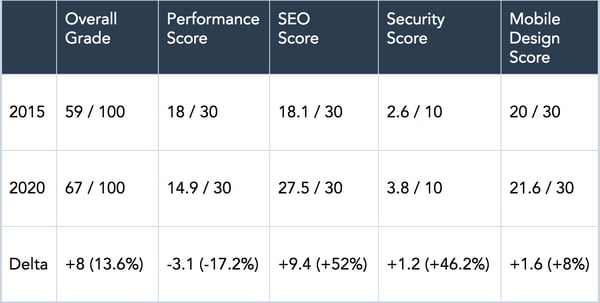

A while ago (as in 12 years ago) we created the first Website Grader. The goal was simple: help anyone with a website evaluate its effectiveness at attracting an audience of interested and relevant buyers.
We founded HubSpot in 2006 and created Website Grader in 2008 because we believed that the inbound methodology — building meaningful, lasting relationships with prospects and customers — was not only a more effective way to grow a business, it was the right way to grow a business. And we knew how important it was for people to leverage their websites to attract visitors and connect with customers to grow.
Your website is a sales rep, providing prospects with the features and pricing of your offering. And helping them book a meeting to learn more.
Your website is part of your customer service team, answering questions about your products and services through a knowledge base or chatbot.
To put it bluntly: your website is really freaking important! Today, 86% of people will find your business online (Small Business Trends). Your website is your first impression, your primary spokesperson, your around-the-clock inbound sales team … you get my point. It’s one of the most important assets to your business.
- Performance: Page speed, load time, page requests, page size, and more.
- Search Engine Optimization (SEO): Page index, meta descriptions, content plugins, and descriptive link text.
- Design: Responsive design, legible font size, and tap targets.
- Security: HTTPS and secure javascript libraries.
Since 2008, we’ve graded over 1 million unique websites on the above four factors. With all this investment, are they actually getting better? Are businesses focusing on the right website upgrades? For example, are websites providing better security for their visitors. Are they offering faster load speeds for quick access? What about mobile accessibility and SEO best practices?
Website Performance Data (2015 vs 2020)

Source HubSpot Research in 2015: data from over 1M unique websites graded. 2020: new data from over 250k unique websites graded.
Website performance has decreased over the past five years.
Websites should load faster in 2020 than they did in 2015. But the exact opposite is true. Performance was the only benchmark metric that decreased in five years. It includes tests for page size, page requests, page speed, and five additional tests that offer a holistic performance grading. Websites are slower today than they were in 2015.
Search engine optimization is the biggest winner.
In a 2020 survey, we found that 64% of marketers are actively investing in search engine optimization (SEO) and growing their organic presence (HubSpot Research).
Security had the second-biggest gain, but the total average falls short.
Our security benchmark shows that websites have improved their security by 46.2% over five years. This is a nice gain but there’s still a lot of room for improvement — the 2020 average score is only 3.8 out of 10.
Mobile optimized websites improved marginally.
In the mid-2010s, it felt like every website was going responsive — that is, investing in mobile-first website design. It made sense.
- "More information about how to solve website problems"
- "Instructions on how to get better performance and SEO to get our score higher"
- "How about putting explanations and guidelines for beginners?"
Introducing the New Website Grader
You talked. We listened. Not only have we updated Website Grader’s grading system and foundational technology to get you a more accurate score, we’ve also created a five-lesson video course that helps you improve your grade. All for free.
Powered by HubSpot CMS Hub, our website now scores a 100 out of 100 on Website Grader — no kidding. It’s something I’m extremely proud of.






